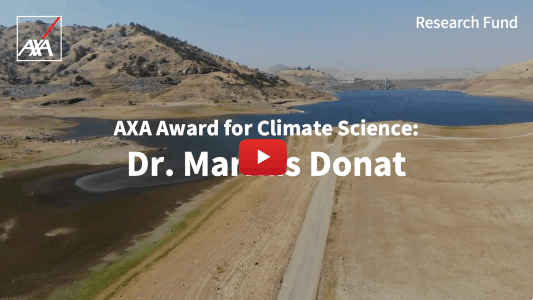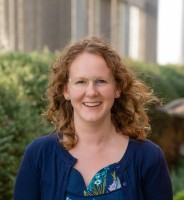Climate Change
Societal Challenges
Climate Adaptation & Resilience
Global Warming
AXA Awards
Spain
Reducing Climate Variability Uncertainties to Improve Climate Adaptation Strategies
Watch the video and read his interview below:

Why is the study of climate variability so important, and what are the real-world impacts of your research?
I am interested in understanding how heat waves, heavy rains, and storms have changed in the past, what controls their occurrence, and how we expect their occurrence to change in the coming years and decades.
Climate extremes often challenge the resilience of a system. Providing accurate and reliable information about how climate extremes are changing (from year to year but also on decadal and multi-decadal time scales) therefore supports a resilient society and enables policymakers to base their decisions on the best possible information.
My research is relevant to other scientists as well as to policymakers and other decision-makers who manage risk. Some of my work has contributed to our fundamental understanding of the climate system, which helps explain the world we live in and motivates further research. Other work has produced data or information useful to practitioners outside academia. For example, actuaries monitoring the risk from climate extremes use some of the datasets I developed, and my work also informs policymakers as part of larger assessments and for summarizing information on the background of specific climate events.
Tell us about your work at the Barcelona Supercomputing Center. What are you working on now and in the near future?
In 2018 I became co-leader of the Climate Prediction Group at the Barcelona Supercomputing Center. I am responsible for a research group of 25 scientists, technical staff, and students.
My group and I are developing methods to improve predictions of climate conditions in the next few decades. We are developing methods that reduce the uncertainty related to climate variability by taking global patterns of decadal variability into account for estimates of near-term climate change. This allows us to provide improved regional climate change information for the next 20 to 30 years, which is the time scale for which many climate change adaptation strategies are implemented.
Another exciting research line explores the extent to which climatic risks can be reduced by implementing land-based mitigation technologies to capture atmospheric carbon and thus mitigate dangerous levels of global warming.
I want to help society tackle some of the major challenges of our time by finding and implementing the right responses to climatic risks in a changing climate. My goal is to provide meaningful information that minimizes extreme climate risks by enabling targeted adaptation and helping implement strategies that avoid dangerous levels of global warming.
What led to your interest in studying climate variability and extremes?
I have always been interested in physics and the environment. I was a passionate windsurfer growing up – so my leisure activities were dependent on weather. I combined these interests and my fascination with weather when I enrolled in meteorology courses at university.
In graduate school, my PhD project focused on understanding how winter storms and related losses are changing in a warming climate. This work laid the foundations for my research into climate extremes. After finishing my PhD, I spent almost 8 years at University of New South Wales in Sydney, Australia, where I had the opportunity to work with some of the leading scientists in the field.
What would you say to scientists interested in a career in your field?
A career in climate science is extremely rewarding because it creates knowledge that directly helps society address one of the most pressing issues of our time. Any successful scientific career requires dedication and passion for the topic. And while it is fun and rewarding to solve problems, hard work and resilience are needed to overcome the normal setbacks that come with doing research.
In your opinion, what is the role of science regarding climate change?
The climate is changing, and we need to understand exactly what this means for the climate-related risks we must anticipate and what options we have for responding. Targeted adaptation and mitigation strategies must go hand in hand as we prepare for the unavoidable and minimize the risk of dangerous levels of climate change. The role of science is to enable informed decision-making by providing robust and reliable information about effective responses, outlining the options, and explaining their benefits, feasibility, and potential risks.
Biography
Dr. Markus Donat is co-leader of the Climate Prediction group at the Barcelona Supercomputing Center, and an internationally recognised expert in studying climate extremes ,climate variability, and predictability. Markus has published more than 95 peer-reviewed journal articles and 4 book chapters since 2010, has contributed to the IPCC 5th Assessment Report and is a contributing author to the IPCC 6th Assessment Report. Markus is Associated Investigator with the Australian Research Council Centre of Excellence for Climate Extremes, and was selected as a member of the World Meteorological Organization (WMO) Expert Team on Data Requirements for Climate Services. He has been awarded the World Climate Research Program (WCRP) / Global Climate Observing System (GCOS) International Data Prize in 2017.
Selected Publications of Dr. Markus Donat
Donat, M. G., L. V. Alexander, H. Yang, I. Durre, R. Vose, J. Caesar (2013), Global land-based datasets for monitoring climatic extremes, Bulletin of the American Meteorological Society, 94, 997-1006, https://doi.org/10.1175/BAMS-D-12-00109.1
Donat, M. G., A. L. Lowry, L. V. Alexander, P. A. O’Gorman, N. Maher (2016), More extreme precipitation in the world’s dry and wet regions, Nature Climate Change, 6, 508–513, https://doi.org/10.1038/nclimate2941
Donat, M. G., A. J. Pitman, and S. I. Seneviratne (2017), Regional warming of hot extremes accelerated by surface energy fluxes, Geophysical Research Letters, 44, 7011–7019, https://doi.org/10.1002/2017GL073733
Donat, M. G., A. J. Pitman, O. Angélil (2018), Understanding and reducing future uncertainty in midlatitude daily heat extremes via land surface feedback constraints, Geophysical Research Letters, 45, 10,627–10,636. https://doi.org/10.1029/2018GL079128
Oliver, E. C .J. M. G. Donat, M. T. Burrows, P. J. Moore, D. A. Smale, L. V. Alexander, J. A. Benthuysen, M. Feng , A. Sen Gupta, A. J. Hobday, N. J. Holbrook, S. E. Perkins-Kirkpatrick, H. A. Scannell, S. C. Straub, T. Wernberg (2018), Longer and more frequent marine heatwaves over the past century, Nature Communications, 9, 1324, https://doi.org/10.1038/s41467-018-03732-9
Vogel, E., M. G. Donat, L. V. Alexander, M. Meinshausen, D. K. Ray, D. Karoly, N. Meinshausen, K. Frieler (2019), The effects of climate extremes on global agricultural yields, Environmental Research Letters, 14, 054010, https://doi.org/10.1088/1748-9326/ab154b
Liu, Y., M. G. Donat, A. S. Taschetto, F. J. Doblas-Reyes, L. V. Alexander, M. H. England (2019). A framework to determine the limits of achievable skill for interannual to decadal climate predictions. Journal of Geophysical Research: Atmospheres, 124, 2882– 2896. https://doi.org/10.1029/2018JD029541
Verfaillie, D., F. J. Doblas-Reyes, M. G. Donat, N. Pérez-Zanón, B. Solaraju-Murali, V. Torralba, S. Wild (2021), How reliable are decadal climate predictions of near-surface air temperature?. Journal of Climate, 34(2), 697-713, https://doi.org/10.1175/JCLI-D-20-0138.1
July 21, 2021

Markus
DONAT
Institution
Barcelona Supercomputing Center
Country
Spain
Nationality
German
Related articles
Sustainable Living & City
Climate Change
Climate Adaptation & Resilience
Urban Planning
Resilient Infrastructure & Safety
Environmental Justice
Post-Doctoral Fellowship
Australia
2023.06.20
Indicators for Climate Resilient City Planning
Expected start date:June-2023 Cities contribute enormously to global greenhouse emissions and are key drivers of climate change. By the same... Read more

Melanie
LOWE
Institut royal de technologie de Melbourne
Climate Change
Pollution
Aerosols & Particulate Matters
Public Health & Health Policy
Toxic Pollutants & Hazardous Substances
Post-Doctoral Fellowship
Greece
2023.06.01
Insight in Dust Fine-Mode to Mitigate Health Hazards in a Changing Climate
Expected start date:June-2023 In late-April/early-May 2022, a surge of remarkable dust storms ravaged Iraq, resulted- according to the World Health... Read more

Emmanouil
PROESTAKIS
